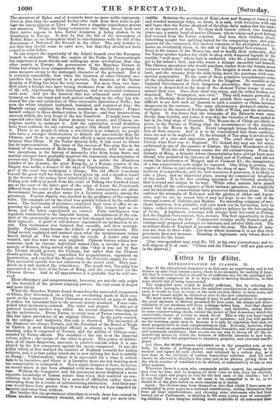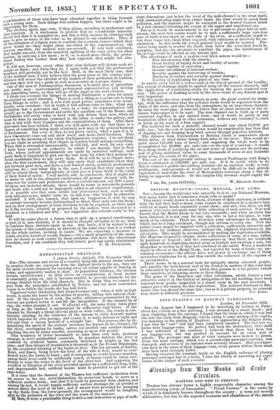Tetra to flit eititur.
REPRESENTATION OF CLASSES. II.
Sin—If the educational franchise is at first only an experiment, and is not broken up into local constituencies, there is no necessity for making it large. All that is wanted is that it should be of sufficient size for the principal par- 41 interests comprised in it to have room to develop themselves, so that none should fail of being represented. The suspended seats would be hardly sufficient. But by reducing the twenty-five boroughs which have the smallest constituencies to one member each, it would be easy to vacate at the next election thirty or forty seats, and those now vacant might be allotted at once to the new constituency. We must never forget, that though it may be safe and prudent to postpone the great measure of Reform promised for next year, the abuses and demo- ralization of our elections will force a change before long. And that Osage cannot but be an extension of the franchise ; and therefore, unless there be some countervailing check, extend the power of that democracy which the comfortable classes of society so much dread. This is why you have urged representation of other classes as well as of numbers; and you will pardon me for insisting again upon it, because it is only by repetition that men are made properly alive to such considerations as this. Itis only, however, when we have made an experiment of the educational franchise, and it has succeeded and commands confidence, that we can see our way to sweep off all the de- moralizing means by which the balance of different interests is now kept, and to give their due proportions to numbers, property, and educated intelli- gence. Let, then, the 90,000 persons calculated on in the pamphlet vote as one body, by means of polling-papers containing a list of candidates, to be marked and signed by each elector, and returned by a certain day, as is now done in the elections of various benevolent societies. And let each elector be allowed to distribute his votes just as be pleases, giving them to the whole number of candidates to be elected, or cumulatively to one or any other number.
Wherever there is a man who commands public respect, his neighbours may vote for him, and by heaping all their votes on him carry his election. It is very right and proper to vote for the beet man of the locality; but I do not think that we ought in all cases to be compelled to do so, as we should be if the plan before us were enacted as it stands.
Again : the electors may form themselves into that which I have seen re- commended in your pages as a national constituency, setting themselves free from all local considerations, and choosing some statesman who had been turned out of Parliament, or starting in life some young man of command- ing abilities. I can imagine nothing more creditable to all concerned than a combination of those who have been educated together to bring forward oeh a young man. Such things will seldom happen, but there ought to be opport unit for thein. The elecytors, again may vote, if they please, according to professions and class interests. It is wholesome to provide that no considerable minority should feel that it is trampled on ; and this is fully secured by allowing each an to give as many of his votes as he pleases to one candidate. Thus, if all the ministers of religion were to combine for a certain ticket—which they never would do—they might carry one-third of the representatives, the lawyers one-fifth, the medical men one-seventh. If very well combined, they might succeed, from the manifold splitting of the votes given for other reasons, in carrying a few more ; or if, as is much more likely, the profes- sional feeling was weaker than they had expected, they might fail alto- gether.
It will not, however, occur often that class feelings will dictate such at- tempts as these; and when they do, I agree with you that the professional members will probably not be the best. Still, in the most likely case, that of the medical men, I fully believe that the good sense of the country prac- titioners will secure the election of the leaders of their profession in London, and that they will feel a pride as well as a security in a proper choice. One of the uses of Parliamentary discussion is to make men of specialties into public men : narrowminded professional representatives will develop into something better, or they will go off the stage at the next election.
I think you overrate the danger of making Parliament a place for minor discussions on small interests. There is such a thing as a count-out to keep dime things in order ; and it acts with great power, sometimes even tyran- nically, over crotchets: but in truth it will seldom come to this ; when any profession has a grievance and votes in a body, its representatives will usually go to the Government and settle the question out of the House, and Parliament will ratify what is fixed with less debate than now, when all must be done by amateurs crammed in the lobby or under the gallery, and time is lost with their blunders and the contradictions of them. After their grievance has been settled, I think you will agree with me that there is a chance of something being made of entirely new men iu the general business of Parliament. But even if they do not prove useful, what a gain it is to have discontent come out and show itself, and make itself harmless. This process is the meaning of our whole Parliamentary economy. I do not think you are right in assuming that cliques in London would manage everything. When this is attempted unreasonably, it will fail, and work its own cure. I have been assured, on authority on which I can depend, that in New York, where judicial appointments are made by universal suffrage, each 1 party finds it expedient to pick out the beat men, for when they propose in- ferior candidates they do not carry them. So it will be as to cliques here; after the first excitement, they will only carry their candidates when they put forward good men, and have a real bond of union, political, professional, religious, &c. ; and when this is the case, I contend that they ought to be able to return them, independently of what you or I may think of the value of their bond of union. I will merely add, in conclusion, that it might not be amiss to add to the educated constituency all persons charged with In- come-tax for trades and professions above a certain amount, say 2001. a year. Of those not included already, there would be many in mercantile pursuits and trade who mould not be improperly added to an educated constituency. It is possible also that some artists and professional men, such as archi- tects and surveyors, might come in, in this way, who would be otherwise excluded. I will also remark, that upon my suggestion, it will be easy as corrupt boroughs become disfranchised to throw their seats into the heap ; and no new arrangement of local divisions would be required, as there must be if the seventy, allotted as proposed by the author, were increased to a hundred or a hundred and fifty : my suggestion also extends easily to Ire- land.
It will be easier also at a future time to split up a general constituency, or part of it, into districts, if it should be thought advisable to do so, than to combine those districts again in one. And lastly, if it be wished to test the action of this constituency in districts at the same time that it is worked for the whole nation, nothing is easier. We are expecting a measure to create elective boards of county finance,—let a small proportion of the mem- bers be chosen in each county by those residents who have the educational franchise, and I am confident they will return good and useful administra-



































 Previous page
Previous page